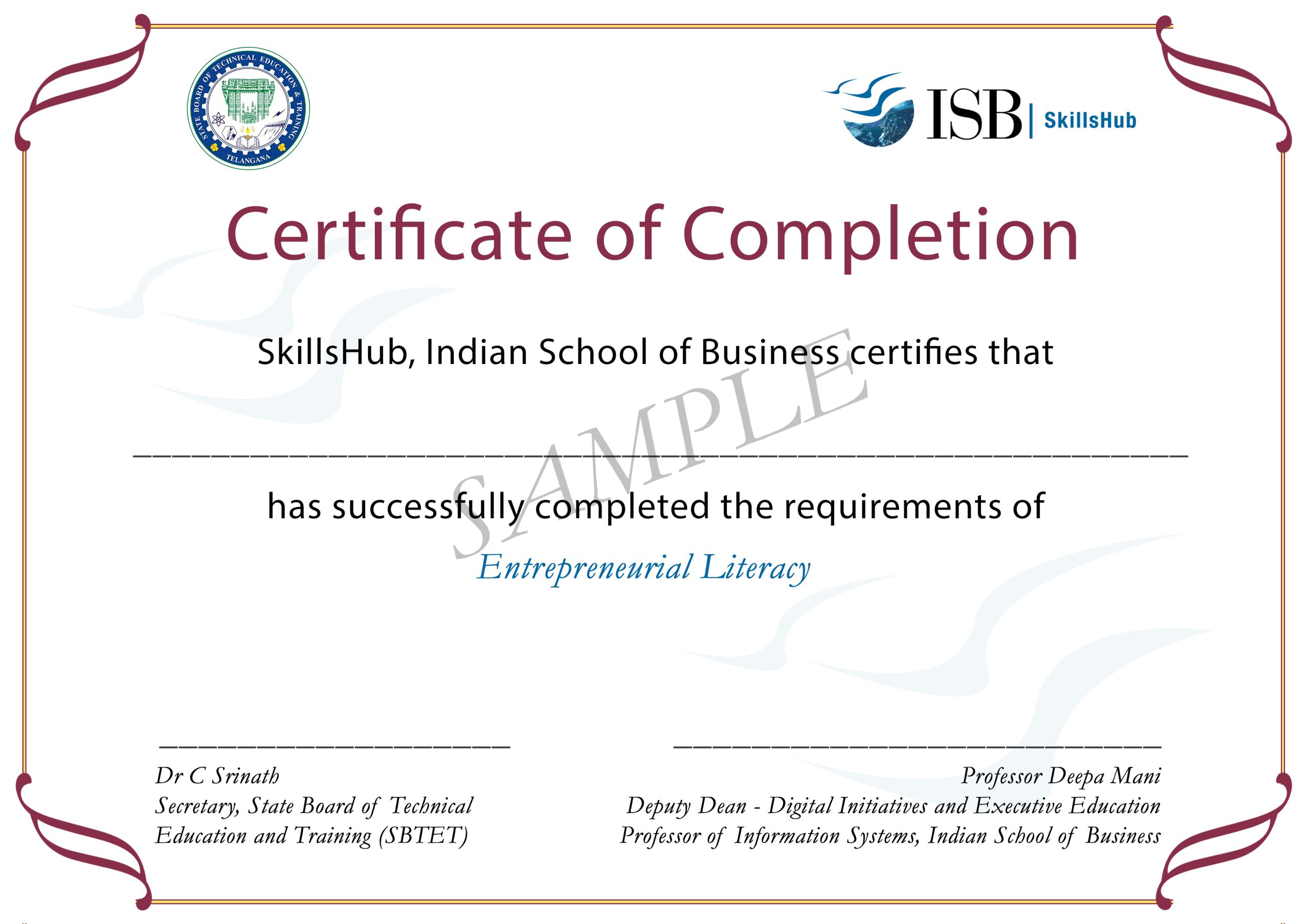Bring out the entrepreneur in you
Bring out the entrepreneur in you
Start your entrepreneurial journey by recognising what it takes to be a successful entrepreneur. The Entrepreneurial Literacy Programme guides you on the stages of the start-up development pipeline and helps you differentiate between an idea and an opportunity.
The programme is divided into four segments – startup fundamentals, functional knowledge, professional management capabilities and IP management.
Startup fundamentals explains the entrepreneurial orientation, provides an understanding start-up development pipeline, and help identify market needs, problems and opportunities.
The second set of courses helps build a core foundation in the critical functions in business – Marketing, Accounting, Finance, Operations Management, and Design Thinking.
The third set of courses empower you with the professional capabilities required to be an effective leader and manager. You will learn about building high-performance teams and attracting and retaining the right talent.
The final segment highlights the importance of safeguarding your innovative product or service, through intellectual property management.
Impact
This programme prepares you to operate and sustain in a highly competitive market and, identify strategies to convert future disruptions into opportunities.
Eligibility
Students from any stream currently pursuing a Diploma/ Bachelor’s/Master’s programme from colleges affiliated with SBTET are eligible for enrolling in these programmes.
Monthly Batches
A new batch starts on the first Monday of every month.
This course starts by defining who an entrepreneur is. It outlines the key qualities that are needed for an entrepreneurial bent of mind. It touches upon the stages in the entrepreneurial process and ends with debunking common myths surrounding entrepreneurship.
This course begins by outlining the stages in the start-up development pipeline. It goes on to explain how ideas are generated and problems are framed. It delves into the HOW of the Lean Approach to entrepreneurship and closes with methods of determining the customer value proposition.
This course answers the nuances of sustainable competitive advantage by differentiating between an idea and an opportunity, identifying the characteristics of a good opportunity and determining the key factors involved in opportunity identification.
This course will provide an overview of the different classes of digital business models that firms use to create and extract value in the digital economy. In particular, we will discuss platform models and merchant models, and the competitive dynamics and business strategies that characterize them.
This course will cover the essentials of marketing principles, processes and tools. Upon completing this course, you will develop an understanding and appreciation of the importance of the marketing function in an organisation, the difference between marketing and sales, several types of This course will cover the essentials of marketing principles, processes and tools. Upon completing this course, you will develop an understanding and appreciation of the importance of the marketing function in an organisation, the difference between marketing and sales, several types of markets and their peculiarities, the centrality of customers in any organisation, what it takes to build a market-oriented organisation, and effect holistic marketing programs.
This course will provide insights into how firms analyse and improve business processes in services or manufacturing by increasing productivity and delivering higher quality standards. Key concepts include process analyses and metrics, methods of evaluating alignment between process and strategy, the link between process metrics and financial outcomes, improving operations, efficiency frameworks such as the philosophy of lean operations and more.
This course will introduce you to the concepts of Design Thinking and the powerful process of designing customer-centric digital products. The course also identifies the metrics to measure and manage ongoing product performance.
This course starts by identifying the steps involved in developing an effective employer branding strategy and goes on to explain how to promote the employer branding strategy on social media. It outlines the key steps of effective talent acquisition and describes the processes and policies needed for retaining talent. It closes by defining the role of a people manager in leading new-age organizations.
This course will teach you how to motivate individual performance and design reward systems, how to design jobs and organize work for high performance, how to make good and timely management decisions, and how to design and change your organization’s architecture. By the end of this course, you will have developed the skills you need to start motivating, organizing, and rewarding people in your organization so that you can thrive as a business and as a social organization.
This course will provide a brief introduction to the fundamentals of finance, emphasizing their application to a wide variety of real-world situations. It delves into using financial statements to analyse business and financial decisions, creating budgets, comparing them to actual spending and identifying techniques for managing working capital.
This course will start by identifying the various stages of funding in the life cycle of a start-up. It further defines the risk-return relationship and explains an optimal mix of debt and equity at which a business's value is maximized. It will close by outlining avenues of borrowing for any business.
This course explains why intellectual property protection is necessary and describes the types of intellectual property. It also outlines the components of the intellectual property strategy for entrepreneurs.

Associate Professor, Strategy

Assistant Professor, Entrepreneurship

Professor of Organisational Behaviour (Practice)

Professor of Marketing (Practice)

Associate Professor of Finance (Practice)

Associate Professor, Operations Management

Professor of Information Systems

Product Head, Google

Please contact skillshub@isb.edu for enrollment queries

